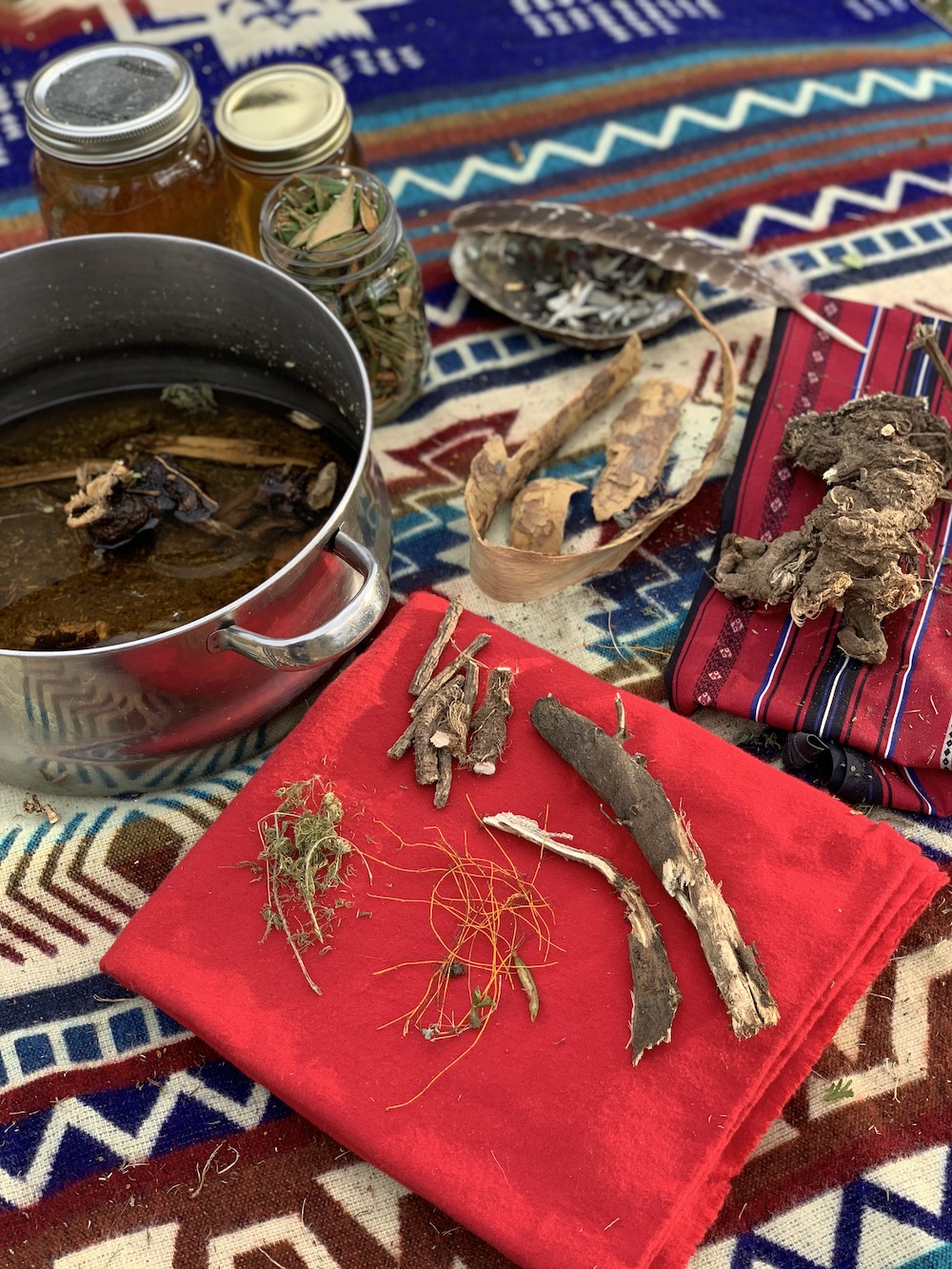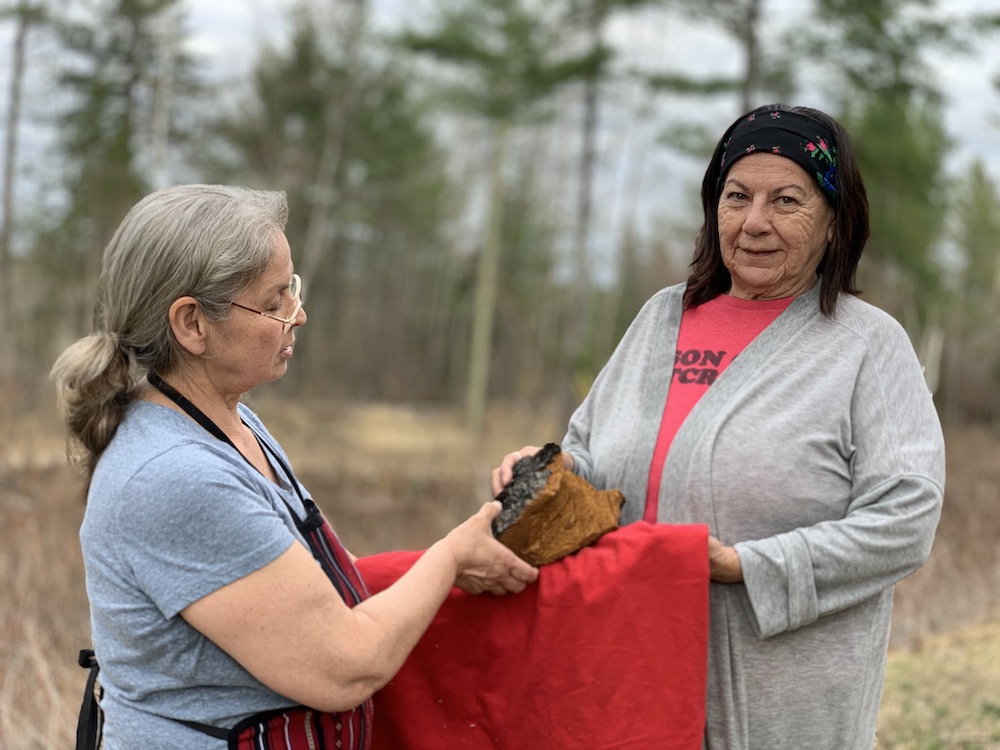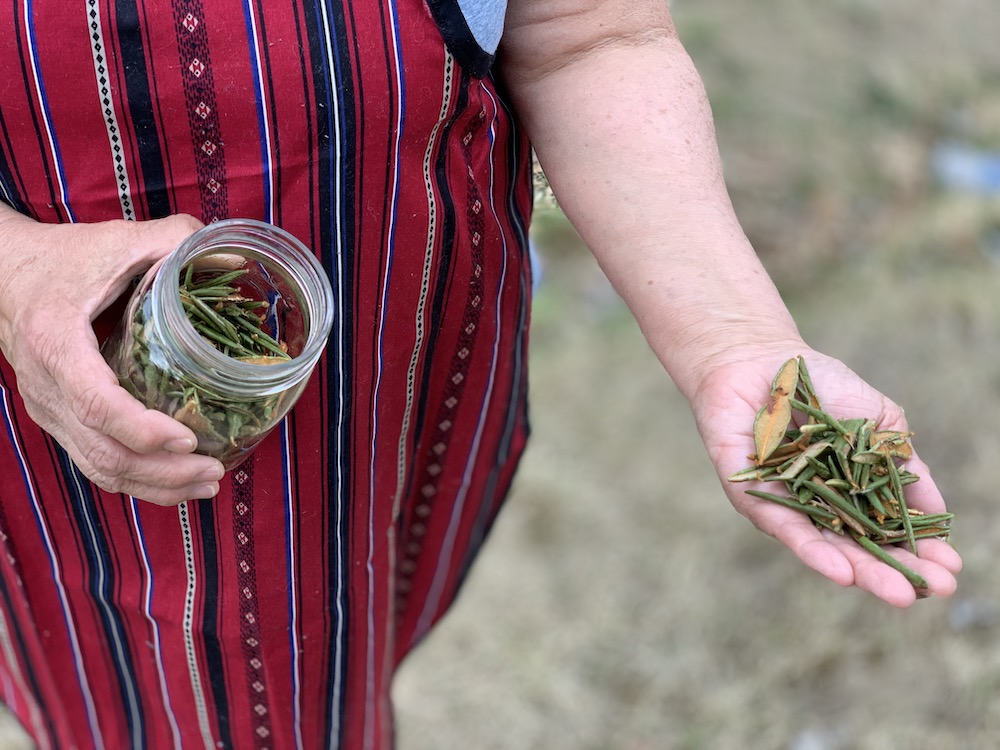Mashkiki: Anishinabe healing and traditions
Text by Millie Knapp
Laura “Lola” Odjick and Catherine “Cotty” Cayer make mashkiki the way their families and community members taught them. Their medicine walks take them throughout Anishinabeg unceded territory. Learning about and sharing mashkiki or traditional medicines inspires them.
“I never charge people for medicine,” says Cayer. She lays tobacco down on the day of her medicine walks. There is spirit in mashkiki.
“This is why we lay down our tobacco when we take medicines from the ground or from a tree. It’s an offering back to the spirits,” says Odjick.

Their search for a particular flower, root, or branch depends on the month. At summer’s end, when weekenz (or rat root) blooms, Odjick’s ready. Weekenz is good for sore throats, colds, or fevers, and can be found in Bitobi Lake near her house. “I usually need somebody that’s strong, because you can’t pull that out by yourself,” says Odjick.
She prefers to find her medicine in the forest. “With Western medicine, there’s too many side effects, I can’t take pills. I don’t like taking anything. What interested me was to know more about the mashkikis we have. That’s why I do what I do,” says Odjick of the Anishinabe healing practice. “There’s always something to learn.”
They invite community members to go with them to see and learn how mashkiki is almost everywhere in the forest. “Wherever golden thread is, you’re going to find peppermint. You also find thousand root,” says Odjick. She has many stories to tell about when, where, and how to find mashkiki.

Odjick uses mashkiki to make mashkikiwabo, a daily tea. This tea aids in the treatment of many ailments.
The roots she uses for teas are harder to find. “I don’t know whether people are picking in the same spot or it’s not growing like it used to. Just like with the clearcutting—all those trees are gone.” She recalls going on a hunting trip to Bark Lake with her nephew, Wilmer Decontie, Jr. “It was just clear cut. I bawled my eyes out,” she says. They left the area bereft.
“That’s why we don’t see moose today: because of that [clearcutting]. They’re migrating and gone up wherever it’s safe for them, probably up James Bay area. I heard once from them they didn’t see much moose up that way and now they do. They’re gone north,” she says.
“If we had more trees, we’d have more animals. That’s what they live off. All that for what? Look at how the earth is off balance,” she says.
Seeking balance, Odjick and Cayer make specific teas for specific purposes. Odjick recently made a tea with yarrow to treat diabetes, and another with golden thread for an eye infection. She describes how, when weensik (yellow birch) is first cut, it smells like Pepto Bismol. The birch bark tea soothes the stomach.

Odjick uses otter tail fat, bear grease, and beaver testicles (or wiijina). Wiijina clears infections inside and outside the body. “It’s very powerful. You’re not to use too much of it,” she says. “Good for many medicines you’re going to make. I put that [wiijina] in my mashkikiwabo.”
When she was a child, Odjick’s recalls a room temperature drop of otter tail oil placed in her ear by her mother. Her moans from a painful infection kept everyone awake. “I was the youngest in the family. They had to find somebody with that medicine,” she says. The otter tail oil was found, a drop placed in her ear, and off to sleep she went. She woke up with no pain.
Red willow eases pain, too. Odjick recalls how red willow helped her one winter when she fell, hurting her hip. She and Wilmer Decontie, Jr. drove “up by Congway” to pick red willow branches. She brought him so she wouldn’t get stuck on the other side of a snowbank with a pained hip. At home, she boiled willow branch scrapings to make a cup of tea before bed. She woke up pain-free.
When its purpose is complete, mashkiki is returned to the earth. “I never put it in the garbage. I bring it to the special site where I return it back to Mother Earth,” says Cayer. Much respect is given to mashkiki from beginning to end.
BIO/ MILLIE Knapp, Anishinabe KWE, writes about arts and culture and mino pimadizawin, the good life.
